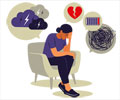In some people, total sleep deprivation for one night can help improve mood and have an antidepressant effect.
- Most antidepressants have side effects like feeling agitated, loss of appetite, or headaches
- A recent study has shown one night of not sleeping at all can have antidepressant effects on some people
- Complete sleep deprivation helped improve mood in some people by increasing the amygdala connection to the anterior cingulate cortex
Sleep disorders as core symptoms of depression
Go to source).
The research team used resting-state functional magnetic resonance imaging to monitor brain area activity in order to understand why some people benefit positively from an otherwise unhealthy public health crisis.
One Night of Total Sleep Deprivation can Help Some People with Depression
The study discovers that in some healthy and depressed people, one night of complete sleep deprivation increased amygdala connection to the anterior cingulate cortex, which was associated with improved mood (2✔ ✔Trusted SourceEnhanced amygdala-cingulate connectivity associates with better mood in both healthy and depressive individuals after sleep deprivation
Go to source).
Researchers investigated the effects of total sleep deprivation (TSD) on mood and functional connectivity networks in sleep deprivation experiments conducted on both healthy individuals (n=38) and patients with major depressive disorder (n=30), as well as 16 controls who were allowed uninterrupted sleep.
For five days, the studies were carried out in the Clinical Translational Research Center laboratory at the University of Pennsylvania Hospital. All subjects completed three sessions of RS-fMRI scanning. Each subject had 210 fMRI pictures taken.
Over the course of five days, participants had three resting-state fMRI scanning sessions. The baseline scan was performed following a regular night's sleep on the morning of day two. Participants in the TSD groups conducted their second scanning session after no sleep on the morning of day three.
The participants were then given two nights of rest before their final scanning session on the morning of day five. During days two through five, all participants completed a 37-item abbreviated version of the Profile of Mood States every two hours.
Most participants' moods worsened quickly after missing a night's sleep, as expected. After one night of TSD, 13 of 30 sad subjects (43%) saw mood improvement, whereas the remaining 17 experienced moods worsening or no change.
Twenty major depressive disorder participants had mood improvement after one night of comfortable sleep, while the remaining participants experienced mood deterioration or no change.
Targeting the Amygdala- Anterior Cingulate Cortex (ACC) Network to Treat Depression
Amygdala-to-anterior cingulate cortex connection increased significantly in mood-improved patients but decreased in mood-unimproved patients. The amygdala is at the heart of the fight or flight response, processing scary or fearful events and directing other regions of the brain to take action.The "emotional" limbic system and the "cognitive" prefrontal cortex are both involved in the anterior cingulate cortex (ACC) brain area. It is important in the ability to control and manage emotional states, as well as affect regulation.
According to the findings, the amygdala-ACC network connection may indicate neuronal resilience to mood alteration following sleep loss and hence may be a viable target for antidepressant therapies.
The Relationship Between Total Sleep Deprivation and REM Sleep
According to the researchers, one possible explanation for individual variances in the TSD effect could be the duration of rapid eye movement (REM) sleep.REM sleep disorders have previously been linked to major depression. Excess REM sleep would reduce noradrenaline levels, resulting in decreased binding to the -2 receptor in the medial frontal lobes, which include the ACC and the medial prefrontal cortex.
With TSD, the lack of REM sleep may provide some participants with a respite to enhance top-down control of the amygdala, resulting in an antidepressant effect.
References:
- Sleep disorders as core symptoms of depression - (https://pubmed.ncbi.nlm.nih.gov/18979946/)
- Enhanced amygdala-cingulate connectivity associates with better mood in both healthy and depressive individuals after sleep deprivation - (https://pubmed.ncbi.nlm.nih.gov/37339227/)
Source-Medindia










